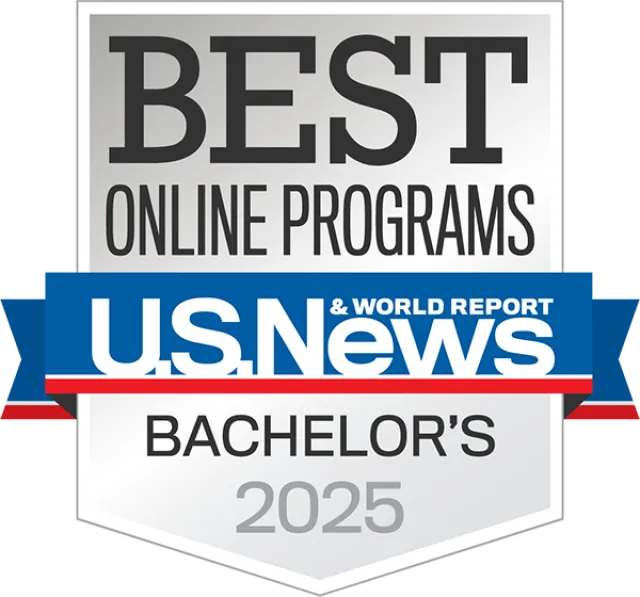Program highlights - build your bachelor's degree
| Accreditation | Accredited by the Higher Learning Commission |
|---|---|
| Program length | 32 months |
| Open electives | 40 of 90 credits are open electives without any restrictions or expiration date! |
| Transfer credit | Transfer up to 90 approved credits |
| Format | 100% online classes + professional studies capstone |
| Pathways | Build your degree: pick 2 of 6 career-focused disciplines: business, criminal justice, health and human services, healthcare administration, network security, and psychology |
Learn More Today!

Ranked by U.S. News & World Report as one of the best online bachelor's programs in 2025
Overview: Interdisciplinary Studies Bachelor's Degree
The Bachelor of Science in Interdisciplinary Professional Studies degree is a 120-credit undergraduate program which prepares you for a career path catered to your strengths. The online degree program provides students with fundamental knowledge and skills in multiple potential focus areas: business, criminal justice, health and human services, healthcare administration, network security, and psychology.

Career-focused curriculum
Discover the crucial knowledge and skills required to succeed in your work and build a foundation for continued career growth.
Flexible schedule
You can take classes during the day or in the evening. We work hard to help you maintain school-life balance, striving to be as flexible as possible for busy non-traditional students.
Virtual services
Access to extensive virtual services, including academic advising, tutoring, support services, technical support and library services.
Lifelong support
We support your ongoing career advancement by providing comprehensive, personalized student services with lifelong career coaching.
Rolling admissions
No application deadlines to worry about. Apply when you’re ready and prepare to get started soon.
Choose online classes that are right for you
By choosing 2 of 6 discipline areas, your education will include classes spanning a wide variety of subjects. You can build the curriculum you need to help you excel in your unique career path.
All classes are delivered online.
| Program | Months i | Semester Credits |
|---|---|---|
| Bachelor of Science in Interdisciplinary Professional Studies | 32 | 120 |
iAverage number of months for students to complete program
Required Courses in Interdisciplinary Professional Studies
All courses, 6.00 semester credit hours, are required.
Required Concentration Areas-Choose Two
18.00 semester credit hours, in each chosen area, are required.
Required Courses in Business Concentration
All courses, 18.00 semester credit hours, are required.
Required Courses in Criminal Justice Concentration
All courses, 18.00 semester credit hours, are required.
Required courses in Health and Human Services Concentration
All courses, 18.00 semester credit hours, are required.
Required Courses in Healthcare Administration Concentration
All courses, 18.00 semester credit hours, are required.
Required Courses in Network Security Concentration
All courses, 18.00 semester credit hours, are required.
Required courses in Psychology Concentration
All courses, 18.00 semester credit hours, are required.
Open Elective Courses
A minimum of 40.00 semester credit hours is required.
Required Courses in General Education
Students enrolled in this bachelor's degree must complete a minimum of 36.00 semester credit hours in general. 12.00 Semester Credit Hours in Communications EN 104 English Composition I EN 111 Information Literacy EN 116 Speech EN 304 English Composition II 9.00 Semester Credit Hours in Humanities HU 140 Cultural Diversity HU 240 Introduction to Humanities HU 340 Humanities and Contemporary Popular Culture 6.00 Semester Credit Hours in Mathematics MA 109 College Algebra MA 320 Statistics 6.00 Semester Credit Hours in Behavioral Science PS 101 Psychology SS 350 Social Issues and Technology 3.00 Semester Credit Hours in Science SC 270 Environmental Literacy Transfer students may transfer courses that are within 1.00 semester credit hour of the courses listed above to meet these discipline requirements. Any resulting deficiency in the total of 36.00 semester credit hours required in general education may be made up with general education electives from any of the listed disciplines.
Personal and Professional Development Courses
A minimum of 2.00 semester credit hours is required.
What is an interdisciplinary studies degree?
For job applicants holding a high school diploma and no college degree, finding “bachelor’s degree” listed as required education on every job posting can be very discouraging.
A bachelor’s degree in interdisciplinary studies is a great choice if you’re looking for a degree to best qualify you for the job you want.
Transfer up to 90 credits from prior college courses, earn your bachelor’s degree faster and begin building your exciting new career.
All from the comfort of your own home. Herzing’s program is 100% online.
Definition
Interdisciplinary studies is the combination of two or more disciplines into a single path of study.
It is where multiple well-beaten educational paths intersect and create something new.
Admissions Requirements



Prerequisites to enroll in the Herzing University Interdisciplinary Studies bachelor's degree program include:
- Prior education requirement. Completion of high school diploma, GED, or equivalent.
- Entrance testing. Applicants must demonstrate the capacity to succeed in college-level courses via prior ACT/SAT scores, completion of prior college credit, or additional entrance testing.
- Availability of time, personal commitment, and a professional attitude. We exist to help enthusiastic students fully committed to reaching their highest career goals. Our faculty and leadership are dedicated to helping you reach them.
You will need to meet and interview with a Herzing University admissions advisor and complete an enrollment application to be admitted into the program.
If you have any additional questions regarding admissions into the program, please contact our admissions team.
Waived Enrollment Fee
Discover the educational pathway designed to maximize your career potential. Reach for greater heights with Herzing University.
What can I do with a degree in interdisciplinary studies?
Herzing University’s interdisciplinary studies degree program emphasizes a career-focused course of study across six unique areas:
- Business
- Criminal Justice
- Health and Human Services
- Healthcare Administration
- Network Security
- Psychology
You can customize a degree program tailored to your career goals consisting of two of these professional discipline areas.
An additional 40 credits in open elective courses allows you further opportunity to specialize your degree to emphasize what’s most relevant to your personalized career path.
Faq
Frequently Asked Questions
Didn't find the answer to your question? Send us an inquiry and we will be happy to answer all your questions!
Degrees in general, multidisciplinary or interdisciplinary studies are by their nature more flexible that alternatives more focused to specific industries.
Herzing University offers many flexible alternatives for online bachelor’s degree programs devoted more exclusively to behavioral health, business, healthcare, public safety or technology, including:
- Business Management
- Computer Science
- Criminal Justice
- Cybersecurity
- Health and Human Services
- Health Information Management
- Health Sciences
- Healthcare Administration
- Information Technology (IT)
- Project Management
- Psychology
Each degree option offers courses designed to help you qualify for many types of jobs within their respective areas of focus.
According to from the Bureau of Labor Statistics, bachelor’s degree holders can earn a significantly higher salary than those with no degree. Bachelor’s-level occupations earned a median annual wage of $1,432 per week, which equates to $74,464 per year (52 weeks).*
The BLS also estimates a lower unemployment rate for bachelor's degree holders vs. those who hold an associate degree, high school diploma, or less than a high school diploma.
A few possible ways students can build a degree to match the career of their choice:
- Students working in a healthcare institution looking ahead to qualify for administrative positions may concentrate their study in business and healthcare administration.
- Students working in IT interested in working in the government or public safety fields may consider concentrating in network security and criminal justice.
- Students who dream of running their own business in the fast-paced technology industry may choose to concentrate in business and network security.
- Students interested in pursuing career pathways in behavioral health may choose to concentrate in health and human services and psychology.
The primary difference between a BS and BA degree is the general positioning of their curriculums:
- Bachelor of Arts (BA): typically concerns a wider variety of liberal arts subjects not directly related to the major. Offered in fields such as the humanities, social sciences, foreign languages and communication.
- Bachelor of Science (BS): typically more strictly focused on the subject matter directly related to the major. Often offered in technical subjects like computer science, physical sciences, nursing or mathematics.
All of Herzing University’s programs are highly career-focused, designed to provide the education you need to position you for the job you want and excel in your career.
Yes!
Earning a degree emphasizing your unique skillset helps you develop the foundational knowledge you need to find a great job and truly excel.
The first step to a new exciting career of your choosing IS possible with Herzing University.
There are many advantages to earning a degree spanning multiple disciplines, including:
- Better qualify for the job. Employers with a unique approach to their workforce may require a unique set of skills, and an interdisciplinary studies degree with relevant concentrations can help show you’ve got what it takes.
- Adaptability. The modern economy is always in flux and there isn’t always a degree relevant to every new opportunity. A multidisciplinary focus can help you adapt more smoothly to changes within your field.
- Earn your degree faster. Depending on the prior college classes you’ve taken, you may be able to transfer much more of your credit compared to a traditional degree program.
General and interdisciplinary studies (sometimes called “integrated studies”) are often used interchangeably, but there is a fundamental difference between the two types of degree programs.
General studies programs typically cover a wide variety of course topics to provide students with broad skills in critical thinking to encourage lifelong learning.
Interdisciplinary/integrated studies programs are more career-focused than general studies, a combination of disciplines designed to help students pursue a particular career path.
A major is a primary discipline of study and a degree is the credential you earn proving your proficiency in any particular major.
There isn’t always a degree designed for every major.
That’s where an interdisciplinary studies degree can fill the gap. Combine concentrations and develop a foundational education in multiple disciplines to fully prepare for new opportunities bridging multiple established industries.
Program Finder
Bachelor of Science in Interdisciplinary Professional Studies
OnlineTo learn more about this program, click the Request Info button.
The Student Experience at Herzing
My advice for current students is to keep pushing and make sure to spread out homework to stay on track!
Samuel Klaustermeier
Business Student | Online CampusI love to help others but knew that direct patient care wasn’t the right path for me.
Carmen Berrios
Healthcare Student | Online CampusMy advice for current students is to keep pushing and make sure to spread out homework to stay on track!
Samuel Klaustermeier
Business Student | Online CampusAccreditation & Disclosures
Herzing University is accredited by the Higher Learning Commission (hlcommission.org), an institutional accreditation agency recognized by the U.S. Department of Education.
* BLS pay estimates calculate the median annual wage for various occupations. Per the BLS the median wage for an occupation is: "The wage at which half of the workers in the occupation earned more than that amount, and half earned less. Median wage data are from the BLS Occupational Employment and Wage Statistics survey." Bureau of Labor Statistics (BLS), U.S. Department of Labor, Occupational Outlook Handbook 2024. BLS median wage estimates do not represent entry-level wages and/or salaries. Multiple factors, including prior experience, age, geographic market in which you want to work, and degree level and field, will affect career outcomes, including starting salary and earnings as an experienced employee. Herzing neither represents that its graduates will earn the median salaries calculated by BLS for a particular job nor guarantees that graduation from its program will result in a job, promotion, particular wage or salary, or other career growth.
Recent Blog Posts
Waived Enrollment Fee
Discover the educational pathway designed to maximize your career potential. Reach for greater heights with Herzing University.






